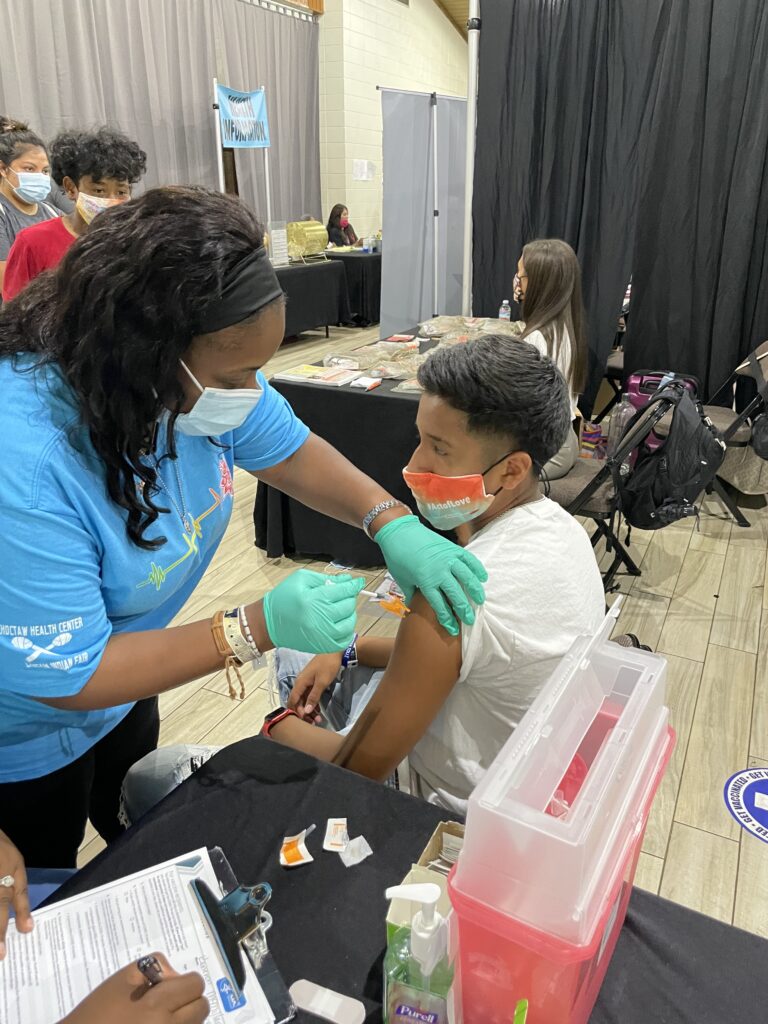To our partners in Tribal health:
Once again we find ourselves confronting another COVID-19 variant and much is still unknown. However, we do know the new Omicron variant has been detected in 45 out of 50 states and the District of Columbia, totaling an estimated 2.9 percent of all COVID-19 cases. We must continue to perform Acts of Love to protect our Tribal communities from this new variant. The new Omicron variant has become a variant of concern, as the number of cases continues to increase. Please consider following the Centers for Disease Control and Prevention (CDC) and National Indian Health Board (NIHB) recommendations to protect yourself and others from COVID-19. The COVID-19 Tribal Resource Center is a great tool available for Tribes to use in their efforts to stop the spread.
Here is what we currently know:
- How easily can the Omicron variant spread? Early information indicates that the Omicron variant can most likely spread more easily than the original SARS-CoV-2 virus. It is currently not known whether the Omicron variant will spread more easily than the Delta variant. The CDC suspects that anyone infected with the Omicron variant can spread the virus to others, even if they are vaccinated or do not have symptoms.
- COVID-19 vaccines continue to be the best way to protect Tribal communities. It is recommended that everyone eligible for a vaccination receive a COVID-19 vaccine as soon as they can. The vaccine helps to protect elders, young children, and those who cannot receive the vaccine due to medical illness. Getting vaccinated is an Act of Love for your community, family, and yourself.
- Does the Omicron variant cause more severe illness? There currently is not enough data available to know if Omicron infections, reinfections, and breakthrough infections in fully vaccinated Tribal citizens cause more severe illness or death than other variants.
- It is recommended that unvaccinated and even fully vaccinated Tribal citizens continue to practice prevention strategies. These include Acts of Love, such as wearing a mask, washing your hands or using hand sanitizer, practicing physical distancing, and disinfecting frequently touched surfaces.
- Do COVID-19 vaccines protect against the Omicron variant? Current vaccines are still expected to offer protection against severe illness, hospitalizations, and deaths due to the Omicron variant. However, breakthrough infections in people who are fully vaccinated are likely to occur.
- COVID-19 vaccines remain the most effective tool to prevent severe illness, hospitalizations, and death. The recent rise in Omicron cases highlights the importance of vaccinations and boosters for eligible Tribal citizens.
- Are current COVID-19 treatments effective against the Omicron variant? Scientists are working to determine how well existing treatments for COVID-19 work against Omicron infections. Some treatments are likely to remain effective.
With the end of the year quickly approaching, families and friends are celebrating holiday traditions. As you plan to gather with family, friends, and others in your Tribal community, it is important to gather as safely as possible whether it be a small gathering, such as a ceremony, or larger like a community feast. The CDC has provided some useful information that everyone can use to make gatherings and travel safer during this time of the year. As the Delta and Omicron variants continue to circulate in the U.S., and around the world, it is recommended that people continue to take precautions such as wearing masks and washing their hands, as well as getting their COVID-19 vaccine or booster.
For more information on how to fight COVID-19 in your Tribal community, please read these resources:
- NIHB Resource: Protecting Tribal Communities During the Holidays
- NIHB Resource: What Variants Should Tribal Nations Be Aware Of?
- CDC COVID-19 Resources for Tribal Communities
- Indian Health Service (IHS) COVID-19 Resources
- NIHB COVID-19 Tribal Resource Center
For more information on the characteristics of the Omicron and Delta variants view the CDC recommendations, click here. If your Tribal community would like additional support with fighting COVID-19, contact Courtney Wheeler, Program Manager at [email protected].

